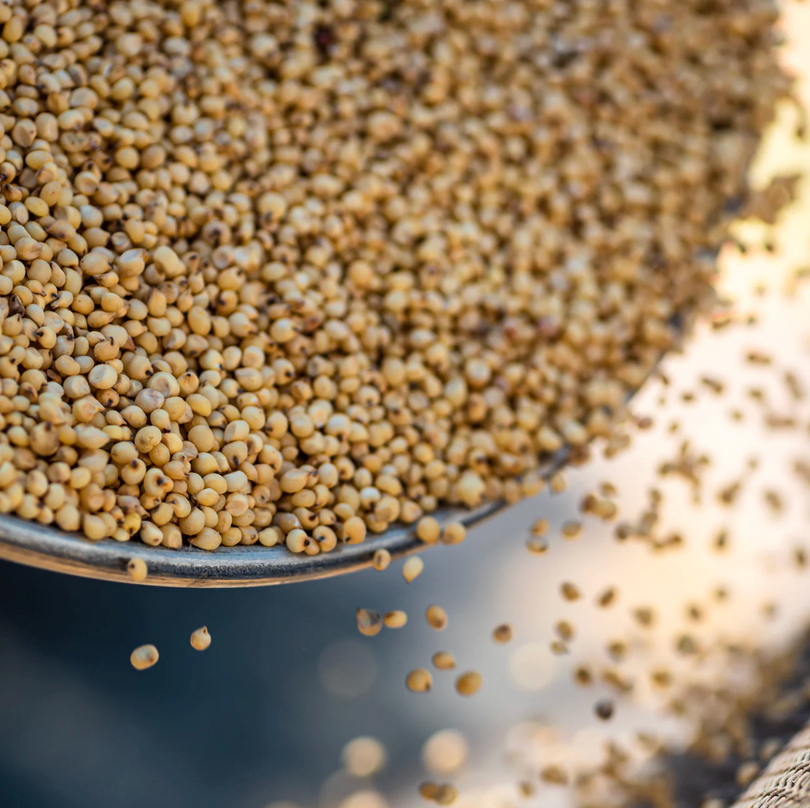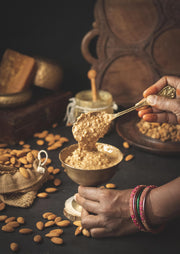Does the comparison between 'Jaggery Vs. Sugar' spark your curiosity? Do you want to know if jaggery is genuinely a better sweetener than white sugar?
Jaggery is something that has been making the rounds on the internet as a healthy alternative to sugar. You must have heard of jaggery or ‘gud’ when growing up.
It holds cultural significance as an after-meal treat, adored by both young and old. However, its benefits go beyond taste, as pregnant women are often advised to include it in their diet for its iron-boosting properties.
Until a few decades ago, jaggery was the most common sweetener in Indian households. However, it was soon replaced by white sugar.
Was the replacement worth it? Or is jaggery a healthier sweetener available to us?
In this blog, we will explore in detail both 'Jaggery Vs. Sugar' and discuss their nutritional values and more.

|
Table of Contents
|
What Is Jaggery, and How Is It Made?

Let’s first discuss what jaggery is. You may know jaggery as a brownish-coloured semi-hard brick-like kitchen ingredient. Or you may identify it as the orange-brownish powder known as ‘shakkar.’
Have you ever wondered how jaggery is made and how it is different from sugar, though both have the same source?
Jaggery is made from different plant sources, according to its type. The method of extraction differs according to the type of jaggery. For example, Sugarcane Jaggery is made by extracting, filtering, and stirring the juice from sugarcane plants.
Don’t worry! Here, we have listed out a few common varieties of jaggeries found on the market according to their making process:
Types of Jaggery
Palm/Date Palm Jaggery

It is made by extracting fresh date palm saps, which are then boiled and stirred.
Read all the 10 Amazing Date Palm Jaggery Benefits - Guide 2023 here.
Sugarcane Jaggery
To make this type of jaggery, sugarcane is crushed to extract the juice, which is then concentrated, filtered, and boiled. The liquid is then frozen and hardened to form jaggery blocks. The form in which it is most frequently ingested is the crystallised form.
Sugarcane jaggery has a pleasant sweetness with a dash of salt based on the juice extracted. It is one of the suitable replacements of white sugar for you.
Palmyra Palm Jaggery
Derived from the sap of the Palmyrah tree, this unique jaggery is made by boiling and concentrating the palmyra sap.
Coconut Jaggery
Delicious and distinct, coconut jaggery is created by boiling and crystallising raw coconut sap. The resulting crystals are then poured into various moulds.
Marayoor Jaggery
Marayoor jaggery is derived from processing sugarcane juice into jaggery balls by boiling it in a unique kind of large kettle and allowing it to condense.
Toddy Palm Jaggery
Crafted by boiling the sap of the toddy palm, this jaggery variety offers a unique and delightful flavour profile.
7 Amazing Health Benefits of Jaggery
Introducing the incredible health benefits of jaggery, a natural sweetener that can help you choose better between jaggery and sugar.
1. Aids in Healthy Digestion
Palm jaggery is known for its digestive benefits. Several people in different parts of India consume small amounts of it after meals as an aid to soothe stomach discomfort, reduce acidity, and promote overall gut health.
It may help your body cleanse the intestinal tracts and activate the digestive enzymes, according to anecdotal data.
2. Rich in Nutrients
Palm jaggery is rich in nutrients that benefit you. It contains iron, which helps to alleviate anaemia by raising haemoglobin levels. On the other hand, magnesium helps control the neurological system.
This natural sweetener's high antioxidant concentration aids your body in preventing free radical damage to bodily cells.
The mineral potassium is the most prevalent in palm jaggery. Potassium aids in the body's fluid and mineral balance as well as the control of blood pressure.
Try to take 10 grams of jaggery daily after meals to get these nutrients.
3. Jaggery Acts As An Antioxidant
As palm jaggery acts as an antioxidant, it helps your digestive system by cleansing and performing an antioxidant action inside your body.
It helps your body get rid of toxins, making you fit and healthy!
4. Helps Relieve Constipation
Since dietary fibres abound in palm jaggery, it helps with digestion and constipation.
Fibre detoxifies your body by removing harmful substances like pollutants and bad cholesterol, promoting bowel movements, and helping you maintain a healthy digestive system.
5. Helps in Relieving Common Ailments
As it possesses therapeutic qualities, palm jaggery was used in ancient times to cure common colds and dry coughs.
By dissolving the mucus, it may aid you in clearing the respiratory tract and can be useful for treating people with respiratory issues like asthma, supporting your overall respiratory health.
6. Helps Reduce Migraines
Jaggery's natural therapeutic properties can relieve migraine aches. By taking 1 teaspoon of palm jaggery, you can experience relief from migraines, making you feel more comfortable during such episodes.
7. Helps You With Weight Loss
If you are worried about losing weight, this is your sign to choose jaggery. This astonishing discovery of potassium-rich palm jaggery should shock you.
This natural sweetener contains more potassium, which helps to lessen bloating and water retention. Therefore, it successfully aids your weight loss attempts.
Of course, a balanced diet and an active lifestyle are also recommended for the best results.
Jaggery vs Sugar: Which one is healthier?
Many people have been opting to replace sugar with healthier sweeteners like jaggery and honey in an effort to maintain a healthy lifestyle.
Does that imply that consuming jaggery is a surefire strategy to cut calories and prevent insulin spikes?
The answer is no. The calories of sugar and jaggery are comparable.
However, a study conducted between jaggery and sugar concluded that both contain comparable calories.
Jaggery contains iron, fibre, and minerals in addition to calories, in contrast to sugar, which just provides calories and no other nutrients.
While jaggery is nutritionally superior to sugar, it is essential to consume it in moderation due to its high-calorie content. People on low-calorie diets should be cautious about their jaggery intake.
If you are feeling lost, here is the solution! We will compare both jaggery and sugar to clear up your confusion. Refer to the table below, which will discuss the differences between sugar and jaggery.
|
Properties |
Jaggery |
Sugar |
|
Colour |
Jaggery can be either dark and golden brown or white and translucent, depending on how long it has been cooked. |
When it is raw, it is dark brown, and when it is highly refined, it is white. |
|
Texture |
It is softer and has a more semi-solid texture. |
Sugar is hard and has a solid texture. |
|
Glycemic Index |
Gi index of jaggery is 84.1. |
Gi index of sugar is of 65. |
|
Nutritional aspects |
When it comes to processing, jaggery retains a good amount of fibre, iron, and other vital nutrients. |
When it comes to processing, sugar loses all its nutritional value as a result of industrial production procedures. |
FAQs: Jaggery Vs Sugar
Is jaggery healthier for diabetics than sugar?
According to nutritional statistics, jaggery is only marginally superior to sugar. Jaggery and sugar are therefore risky for those who have diabetes, especially when consumed in excessive amounts.
What is the difference between jaggery and molasses?
Jaggery and molasses are both produced from sugarcane juice. What is left over after sugar is taken from sugar cane juice to make sugar is referred to as molasses. In contrast, the method for making jaggery involves concentrating the whole sugarcane juice.
Brown sugar or jaggery powder: Which is better?
Jaggery is considered healthier than ‘brown sugar’ and a good replacement for white sugar.
How much jaggery should I consume each day?
For daily use, 10 grams of jaggery should be adequate. It is without a doubt a more wholesome and healthy form of sugar, but sugar nonetheless.
Does Jaggery Cause Diabetes?
While eating jaggery in moderation is not likely to cause diabetes, excessive consumption of jaggery or any high-sugar food can contribute to an increased risk of diabetes and other health issues.
Does Jaggery Increase Belly Fat?
Consuming jaggery in moderation is unlikely to directly cause an increase in belly fat. However, overeating any high-calorie food, including jaggery, can contribute to weight gain if not balanced with an active lifestyle.
What does the term "cane jaggery" refer to?
Cane jaggery is a traditional sweetener made from sugarcane juice. It's known for its rich, earthy flavor and is used in various cuisines to sweeten dishes, both sweet and savory.
Palm jaggery vs sugarcane jaggery: Which is better?
Both palm jaggery and sugarcane jaggery have nutritional benefits. Palm jaggery may offer additional minerals, while sugarcane jaggery has a traditional rich flavor. The choice depends on personal preference and nutritional priorities.
Is jaggery a healthier alternative to sugar?
Jaggery is often considered a healthier alternative to refined sugar due to its less refined nature. It retains some vitamins and minerals, such as iron, magnesium, and potassium, which are usually lost during sugar refinement. However, moderation is key, as both jaggery and sugar contribute to calorie intake and should be consumed mindfully.
Can jaggery be used in beverages like tea or coffee instead of sugar?
Yes, jaggery can be used as a natural sweetener in beverages like tea or coffee. Dissolve it in hot water before adding it to your drink. Keep in mind that the distinctive flavor of jaggery may alter the taste of your beverage.
Conclusion
In this race of Jaggery vs. Sugar, who do you think is in front?
Throughout the blog, we discussed in detail both items to give a better picture for you to decide whom you will choose. While sugar loses its nutritional aspects after processing, jaggery still contains nutrients even after processing.
Whichever option you choose, as it depends on your personal preference, make sure to consume a balanced amount. Don’t go overboard.
Always listen to your body and enjoy sweet treats responsibly. Your health matters, and making informed choices can lead to a happier life.
If you are wondering where to get your jaggery from, don’t worry; we got you. Get yourself organic and high-quality products from Two Brothers Shop.
Read more :All About Sugarcane Jaggery Powder - Benefits, Uses, and More
How to Make Bakshalu with Jaggery - Yummy Recipe for 2023













